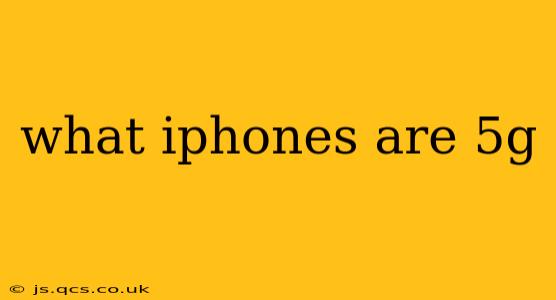The rollout of 5G technology has revolutionized mobile connectivity, offering significantly faster speeds and lower latency than its predecessor, 4G LTE. If you're considering an iPhone and want the benefits of 5G, understanding which models support it is crucial. This guide will clarify which iPhones are 5G compatible and delve into the nuances of 5G connectivity.
Which iPhone models support 5G?
Generally, any iPhone released in 2020 or later supports 5G. However, the specific 5G capabilities vary slightly between models. Here's a breakdown:
- iPhone 12 mini, iPhone 12, iPhone 12 Pro, iPhone 12 Pro Max: These were the first iPhones to feature 5G connectivity.
- iPhone 13 mini, iPhone 13, iPhone 13 Pro, iPhone 13 Pro Max: These models built upon the 5G capabilities of the iPhone 12 series, often with improved performance and wider 5G band support.
- iPhone 14, iPhone 14 Plus, iPhone 14 Pro, iPhone 14 Pro Max: The iPhone 14 lineup further enhanced 5G performance, offering even faster speeds and broader compatibility.
- iPhone SE (3rd generation): While not a flagship device, the 3rd generation iPhone SE offers 5G connectivity.
- iPhone 15, iPhone 15 Plus, iPhone 15 Pro, iPhone 15 Pro Max: (Released September 2023) The latest models boast the most advanced 5G technology currently available in iPhones.
It's important to note that even within a single generation, there might be subtle differences in 5G performance depending on the specific model and its internal modem.
What are the different types of 5G?
Understanding the different types of 5G is vital to grasping the capabilities of your iPhone. There's not just one type of 5G; instead, there are several sub-6 GHz and mmWave technologies.
-
Sub-6 GHz: This is the most widely available 5G technology, offering good coverage and speed improvements over 4G. Most 5G iPhones support sub-6 GHz.
-
mmWave (millimeter wave): This offers significantly faster speeds than sub-6 GHz but has limited range and penetration. Availability depends on your location and carrier's network infrastructure. Not all 5G iPhones support mmWave; it's generally found in higher-end models.
Does my 5G iPhone work with all 5G networks?
No, not all 5G iPhones work with all 5G networks worldwide. The supported 5G frequencies (bands) vary depending on the iPhone model and the region it was released in. Check your iPhone's specifications or your carrier's website to confirm compatibility.
How can I check if my iPhone is using 5G?
You can usually check your iPhone's cellular connection type in the Settings app. Look under Cellular or Mobile Data, and you should see an indicator showing whether you're connected to 5G, 4G LTE, or a different network type.
What are the benefits of having 5G on my iPhone?
5G offers several key advantages:
- Faster download and upload speeds: Significantly faster than 4G, allowing for quicker downloads, smoother streaming, and faster uploads.
- Lower latency: Reduced lag time, making online gaming, video conferencing, and other real-time applications more responsive.
- Improved network capacity: Handles more connected devices simultaneously, leading to a more reliable network experience, even in crowded areas.
What if my iPhone doesn't have 5G?
If you have an older iPhone that doesn't support 5G, you'll still benefit from 4G LTE connectivity. However, you'll miss out on the speed and performance advantages that 5G provides. Upgrading to a newer model that supports 5G might be worthwhile if these improvements are important to you.
This comprehensive guide should help clarify which iPhones support 5G and answer common questions regarding its implementation. Remember to always check your specific iPhone model and carrier's network coverage for the most accurate information on 5G capabilities.
